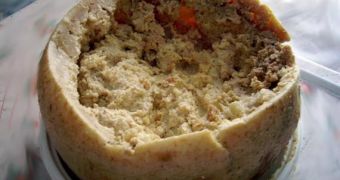File this under oddities, or under “reserved exclusively for the daring.” Casu Marzu is, for those who haven’t heard of it yet, a type of cheese made of sheep milk and found in Sardinia, Italy. What is peculiar about it is that it comes filled with live larvae, which is why it is also illegal for obvious health reasons. However, it is said to have an exquisite taste so, for those of you bold enough to try it out, read on to see how you can eat it.
As already noted, what makes the Casu marzu so special is the fact that it is beyond the state of alteration of blue and green cheese, an approximate translation of its name labeling it “rotten cheese.” Nevertheless, it’s the maggots that pose a threat to one consuming it, and this is precisely where you should also pay the most attention, if what you’ve read so far got you even remotely considering it.
The larvae of the cheese fly Piophila casei, which are intentionally placed in the cheese before fermentation begins, help break down the fats in it. When a slice of Casu marzu hits the black market in Sardinia, it is literally filled with thousands such translucent maggots. Most people prefer to eat the cheese without them, others don’t. For the latter category, it’s advised they cover their eyes when they eat a Casu marzu sandwich (with moistened Sardinian flatbread, and a glass of strong red wine), as the maggots can launch themselves for distances of up to 15 centimeters, aiming right for the eyes.
Those who are daring enough to try the maggot cheese but without the maggots should bear in mind that Casu marzu is believed to be extremely toxic, therefore inedible, once these die. If you want to pick out the larvae, you should put the slice of cheese in a paper bag that you seal. The maggots will soon run out of oxygen, which you will know once you no longer hear the “pitter-patter” sound they make as they struggle for life. Once this is over with, there is nothing stopping you from picking them out and enjoying your slice of cheese, maggot-free.
Should all of the above have come in handy to you, remember that Casu marzu has been outlawed, and be aware of the dangers you are exposing yourself to. All grossness factor aside, health experts warn of possible allergic reactions prompted by consuming cheese that has advanced to a toxic state, as well as of that of intestinal larval infection, as these maggots are extremely strong and are unharmed by the stomach acid.

 14 DAY TRIAL //
14 DAY TRIAL //